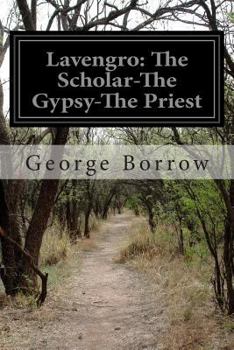Lavengro: The Scholar-The Gypsy-The Priest
(Part of the Lavengro Series)
Select Format
Select Condition 
Book Overview
This collection of literature attempts to compile many of the classic, timeless works that have stood the test of time and offer them at a reduced, affordable price, in an attractive volume so that everyone can enjoy them.
Format:Paperback
Language:English
ISBN:1502458683
ISBN13:9781502458681
Release Date:September 2014
Publisher:Createspace Independent Publishing Platform
Length:144 Pages
Weight:0.44 lbs.
Dimensions:0.3" x 6.0" x 9.0"
Customer Reviews
4 ratings
Among the English gypsies, mid-19c
Published by Thriftbooks.com User , 19 years ago
I read an older edition of this reprint, written in the middle of the 19c by a polymathic, apparently largely self-educated, English wandering scholar who popularized his adventures, usually among the gypsies in England (as here) and later in Spain, as well as among the native Welsh. This book suits a lazy, digressive, and leisurely pace. Borrow cannot obtain a position in the military due to his father's lack of clout and little cash, so he goes to London to try to make his fortune by various legit and shady schemes, among them the shell game, publishing, and being a writer for hire. Outrageous coincidences occur in Dickensian style as he wanders about, running in to the same small circle of cronies over and over to instructive effect! I cannot tell where Lavengro ends and Romany Rye begins, but by the subtitle of the first, "The Priest, the Scholar, and the Gypsy," I assume this refers to Borrow's conversations with these folks on philological, historical, and theological topics. The latter part of the work finds Borrow trying to pursue a trade as a smith while living in a dingle, courting a refugee lass from a pair of pugilistic thieves--whom Borrow tries to teach Armenian as a covert way with which to communicate with her--and carrying on with a very freethinking lifestyle against authority, very early Victorian style. No dates and few locales are given, so all of this happens in sort of post-Regency vacuum. Borrow in that long-winded, autodidactic, eccentric manner latches on to a hobby-horse and rides it as long as he wishes, but he manages to be provocative, entertaining, and a wonderful companion, probably more so on paper than he might be in person! His obsessive determination to teach an ex-workhouse girl Armenian declensions and conjugations strikes me as either wonderfully tongue-in-cheek or dismayingly oblivious. The pleasure of the book is that I cannot decide which.
An autobiographical novel of late nineteenth century England
Published by Thriftbooks.com User , 19 years ago
George Borrow lived in England during the nineteenth century. This book and it's sequel "The Romany Rye" are somewhat autobiographical in the way that "Portrait of the Artist as a Young Man" is autobiographical about James Joyce. This book is also not a novel in its true form. It's more a vivid description of the English countryside and what it was like during Borrow's lifetime. The book and its sequel were not very well received when first published because English people did not want to read about gypsies and the gypsy lifestyle. Borrow's black psyche comes through in these pages quite clearly as he tries to explain his life and the problems that he encounters. As I read the book, I felt it was like seeing a real man's life, as it surely was. There are three main characters in the book - a scholar, a Gypsy and a Priest. Borrow takes quite a kick at Roman Catholicism and the pomp and circumstance of that religion in his book. But even with that his Priest is a shown as a very good man trying to bring his message to the masses. I did not read the next book "The Romany Rye", but this one was pretty good as a stand-alone.
Literary buff's joy
Published by Thriftbooks.com User , 22 years ago
I thoroughly enjoyed Borrow and look forward to meeting this character in heaven, where I believe he and Tolkien are having a great time talking philology. This is one of those books that, when you are done reading, you feel that you have made a friend and you miss him now that it's over. I am eager to read his other writings.
entertaining, educational, particularly memorable
Published by Thriftbooks.com User , 26 years ago
This book (including Romany Rye, the sequel) is not an example of high-minded literature, but rather the account of Borrow's early life, and the beginning of his adventures. All escapades take place in the United Kingdom, of which he is admirably patriotic. As a character, he is actually somewhat quiet; but the situations and especially people he meets are both tangibly real (to a degree that I find unusual in a work of that time) and outlandish by any standards, Victorian (?) England's or ours. Above all the stories were fascinating, and are stamped permanently in my memory.While one needs a taste for the "philological" to enjoy and understand these adventures, they are still only marvelous anecdotes, including brilliant character portraits and memorable descriptions.One small quality that I appreciated, particularly since he writes so much of his experiences with Gypsies, is that Borrow is probably less rascist than many of his contemporaries seem to b! e.By the way: while The Bible in Spain has the same qualities as Lavengro and Romany Rye, it is not nearly as well written; he indulges his taste for dry ramblings much more, and the interesting stories seem almost arbitrary in when he tells them and when he ends them; were he still alive, there would be much that I'd like him to elaborate on.If anyone can tell me about his other writings (I have the impression that the quality can vary) I'd really appreciate some advice through email.







